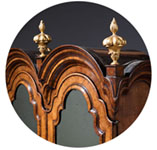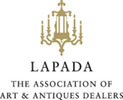A Fine and Rare Three Part George I Burr Walnut Bureau Bookcase, Circa 1720-1730. England
Sold
Follow Us
A Fine and Rare Three Part George I Burr Walnut Bureau Bookcase, Circa 1720-1730. England
Attributed to Coxed and Woster (1700-1735)
A fine George I burr walnut feather banded bureau bookcase consisting of three sections, the chest, bureau and bookcase. The bookcase is surmounted with a cavetto moulded cornice above a pair of inset moulded and shaped mirrored doors opening to reveal an arrangement of fitted double D-moulded shelves. Retractable candle slides are positioned at the base of each mirrored door.
The bureau, with applied cross-grain ogee-moulded bookrest, supported by retractable lopers divided by two short oak lined feather banded drawers, each fitted with the original gilt-brass ring-pull handles, oval escutcheons and locks. The cross-grain moulded feather-banded fall opens to reveal what is possibly the original inset leather writing surface in front of an arrangement of pigeon holes, small and long feather-banded drawers, each fitted with the original knobs. To the centre is a feather-banded cupboard between Tuscan columns concealing three hidden drawers.
The ovolo waist moulded chest is raised on ball and bracket feet. It is fitted with three graduating oak-lined feather-banded drawers, each fitted with the original gilt-brass ring pull handles, oval escutcheons and locks.
A truly rare and superb quality piece, with choice use of quality burr veneers throughout its construction.
Literature. Coxed and Woster was a partnership formed after the death of John Coxed. In his will, John left instructions for his widow, Grace, to ‘go partners’ with his brother-in-law, Thomas Woster, who was also a cabinet maker. Grace Coxed was married and widowed twice, both husbands being cabinet makers. Her first marriage was to John Mayo, who at his death left his business in the hands of his widow Grace. One of Mayo’s apprentices was John Coxed, who completed his term of indenture under Grace’s supervision on 7 September 1703. Grace managed her cabinet making business after her first husband’s death for seven years before she married John Coxed in 1707. They were married married for ten years until his death in November 1718.
Grace’s role in the business is unknown: there are no records of her activity in London Companies, or accounts of her business transactions, but she was presumably involved in running the cabinet making firm, Coxed and Woster from her second husband’s death in 1718 until she died in 1735.
A number of desks, bureaux, bureau cabinets, secretaire cabinets and chests of drawers dating from the period 1720–35 have been found with the trade labels G. Coxed & T. Woster (e.g. Colonial Williamsburg). Typically, they are veneered in walnut or burr maple and some pieces are embellished with rosewood crossbanding and pewter stringing. The fullest known trade label reads ‘G.Coxed and T.Woster At the White Swan, against the South-Gate in St Paul’s Church Yard, London, Makes and Sells Cabinets, Scrutoires, Desks and Book-Cases, Buro’s Chests of Drawers, Wisk, Ombre, Dutch and Indian Tea-Tables; All sorts of Looking-Glasses, Large Sconces, Dressing Sets and Wainscot-Work of all sorts, at Reasonable Rates. Old Glasses New polished and Made up fashionable.’
Condition
Good. Wear consistent with age and use.
Dimensions
Height: 226 cm / 89 Inches
Width: 103 cm / 40 1/2
Inches Depth: 60 cm / 23 1/2 Inches
PREVIOUSLY SOLD
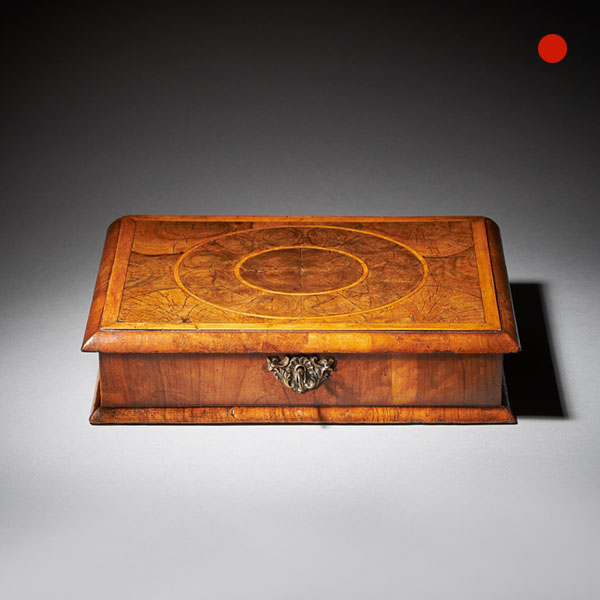
A Fine William and Mary 17th-Century Olive Oyster Lace Box
A Fine William and Mary 17th-Century Olive Oyster Lace Box Sold Follow UsA Fine William and Mary 17th-Century Olive Oyster Lace Box A Fine Late 17th Century Olive Oyster 'Lace Box' of Small Proportions. Circa 1680-1690 England. The...
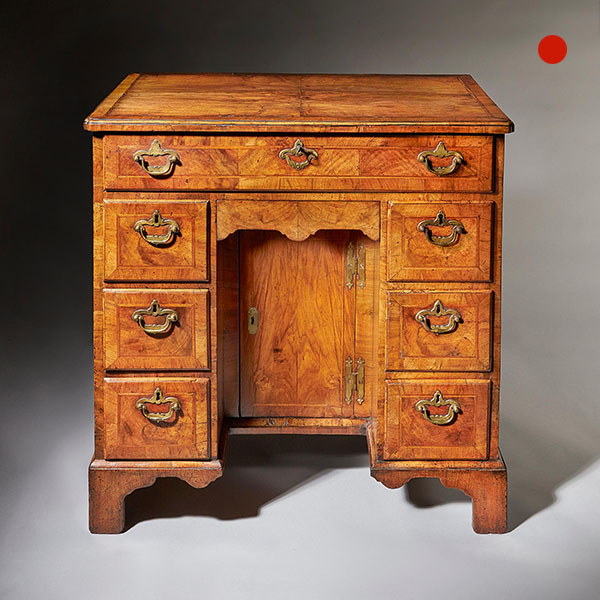
Figured Walnut George II 18th Century Kneehole Desk Attributed to Elizabeth Bell
Figured Walnut George II 18th Century Kneehole Desk Attributed to Elizabeth Bell £7,600 Follow UsFigured Walnut George II 18th Century Kneehole Desk Attributed to Elizabeth Bell A Fine George II Figured Walnut Kneehole Desk Attributed to...
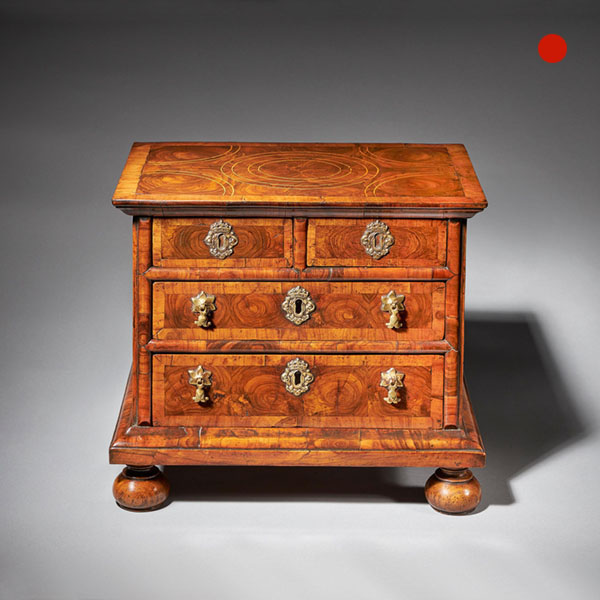
Diminutive 17th century William and Mary Olive Oyster Miniature Chest of Drawers
Diminutive 17th century William and Mary Olive Oyster Miniature Chest of Drawers Sold Follow UsDiminutive 17th century William and Mary Olive Oyster Miniature Chest of Drawers From the reign of King William & Queen Mary (1688-1702)...
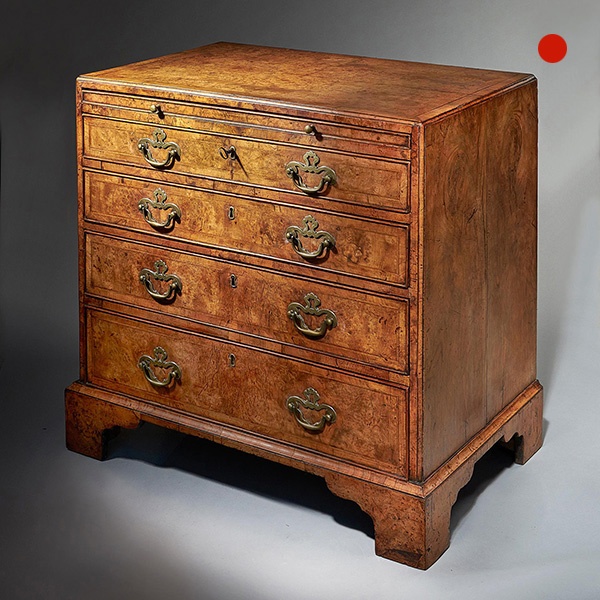
George II Burr/Burl Walnut Caddy Topped Chest, circa 1730-1740
George II Burr/Burl Walnut Caddy Topped Chest, circa 1730-1740 SOLD Follow UsGeorge II Burr/Burl Walnut Caddy Topped Chest, circa 1730-1740 An important George II burr walnut caddy topped chest, circa 1730-1740. With firm...
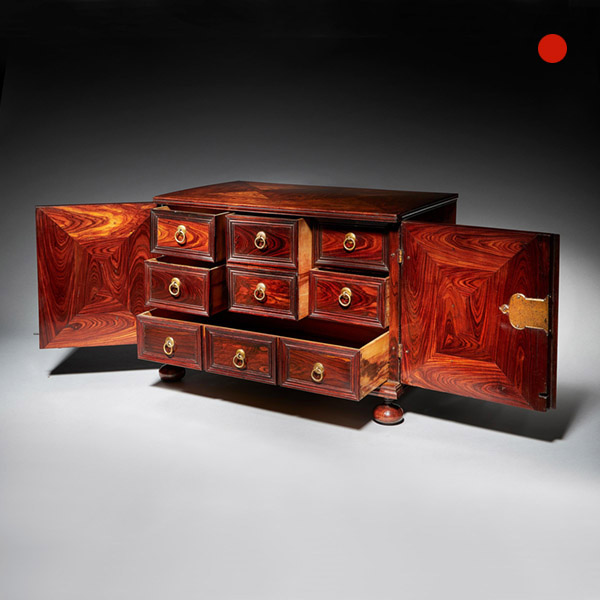
Extremely Rare and Fine Miniature Kingwood Table Cabinet from the Reign of Charles II
Extremely Rare and Fine Miniature Kingwood Table Cabinet from the Reign of Charles SOLD Follow UsExtremely Rare and Fine Miniature Kingwood Table Cabinet from the Reign of Charles Extremely rare and fine miniature kingwood table cabinet from...
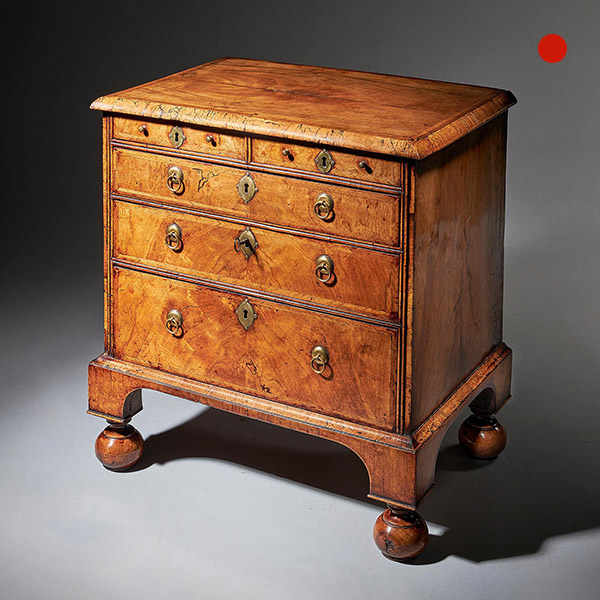
An extremely rare George I walnut chest of small proportions on ball and bracket
An extremely rare George I walnut chest of small proportions on ball and bracket SOLD Follow UsAn extremely rare George I walnut chest of small proportions on ball and bracket The cross-grain moulded and feather banded book-matched top sits...

A Fine William and Mary 17th-Century Olive Oyster Lace Box
A Fine William and Mary 17th-Century Olive Oyster Lace Box Sold Follow UsA Fine William and Mary 17th-Century Olive Oyster Lace Box A Fine Late 17th Century Olive Oyster 'Lace Box' of Small Proportions. Circa 1680-1690 England. The...

Figured Walnut George II 18th Century Kneehole Desk Attributed to Elizabeth Bell
Figured Walnut George II 18th Century Kneehole Desk Attributed to Elizabeth Bell £7,600 Follow UsFigured Walnut George II 18th Century Kneehole Desk Attributed to Elizabeth Bell A Fine George II Figured Walnut Kneehole Desk Attributed to...

Diminutive 17th century William and Mary Olive Oyster Miniature Chest of Drawers
Diminutive 17th century William and Mary Olive Oyster Miniature Chest of Drawers Sold Follow UsDiminutive 17th century William and Mary Olive Oyster Miniature Chest of Drawers From the reign of King William & Queen Mary (1688-1702)...

George II Burr/Burl Walnut Caddy Topped Chest, circa 1730-1740
George II Burr/Burl Walnut Caddy Topped Chest, circa 1730-1740 SOLD Follow UsGeorge II Burr/Burl Walnut Caddy Topped Chest, circa 1730-1740 An important George II burr walnut caddy topped chest, circa 1730-1740. With firm...

Extremely Rare and Fine Miniature Kingwood Table Cabinet from the Reign of Charles II
Extremely Rare and Fine Miniature Kingwood Table Cabinet from the Reign of Charles SOLD Follow UsExtremely Rare and Fine Miniature Kingwood Table Cabinet from the Reign of Charles Extremely rare and fine miniature kingwood table cabinet from...

An extremely rare George I walnut chest of small proportions on ball and bracket
An extremely rare George I walnut chest of small proportions on ball and bracket SOLD Follow UsAn extremely rare George I walnut chest of small proportions on ball and bracket The cross-grain moulded and feather banded book-matched top sits...
YOU MAY ALSO LIKE
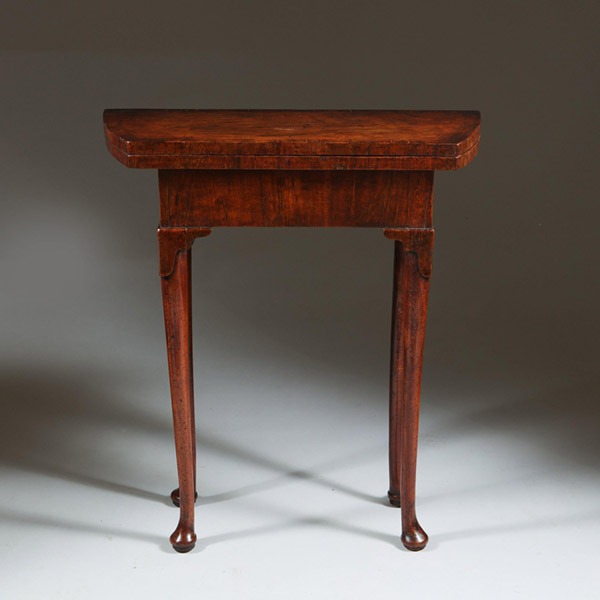
A Unique Early 18th Century Diminutive George I Figured Walnut Bachelors Table
A Unique Early 18th Century Diminutive George I Figured Walnut Bachelors Table £12,800Follow UsA...
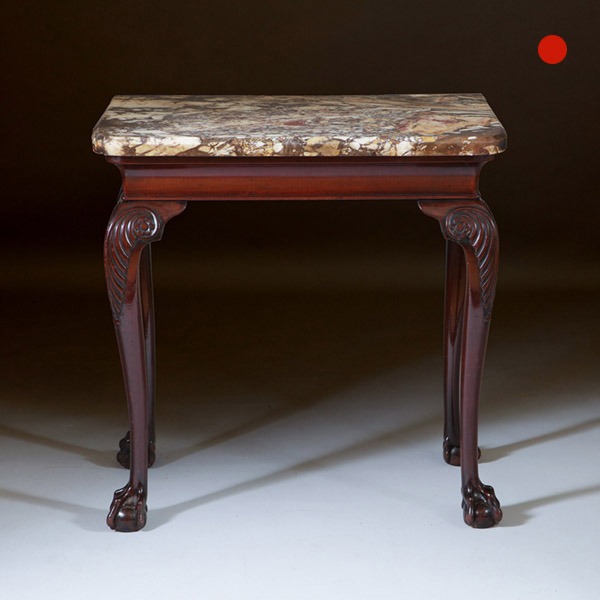
A Fine 18th Century George II Mahogany Marble Topped Console Table, Ireland
A Fine 18th Century George II Mahogany Marble Topped Console Table, Ireland SoldFollow UsA Fine...
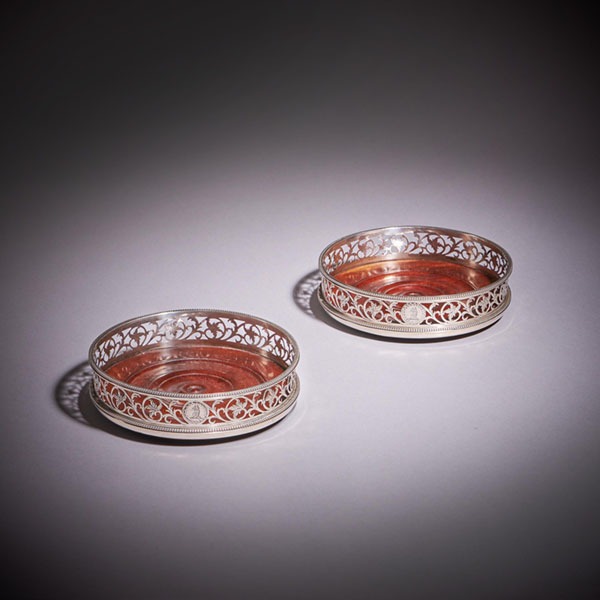
A Fine Pair of 18th Century George III Silver Engraved Open Fret Wine Coasters
A Fine Pair of 18th Century George III Silver Engraved Open Fret Wine Coasters £3,600Follow UsA...
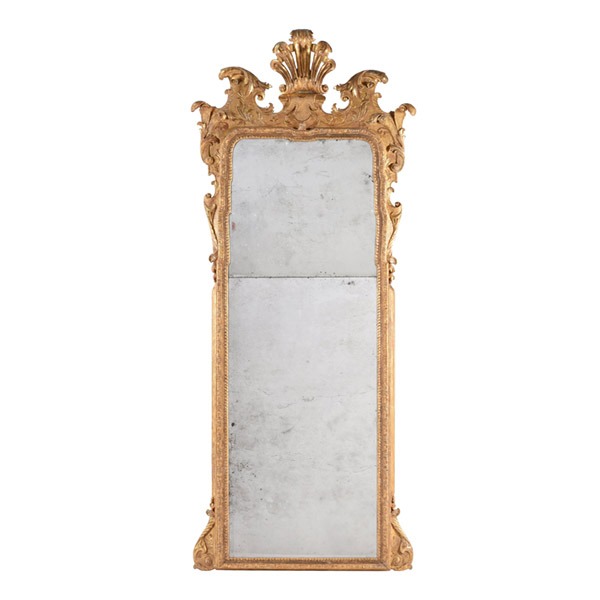
A Large 18th Century George I Gilt-Gesso Pier Glass, Attributed to John Belchier
A Large 18th Century George I Gilt-Gesso Pier Glass, Attributed to John Belchier £42,000Follow UsA...
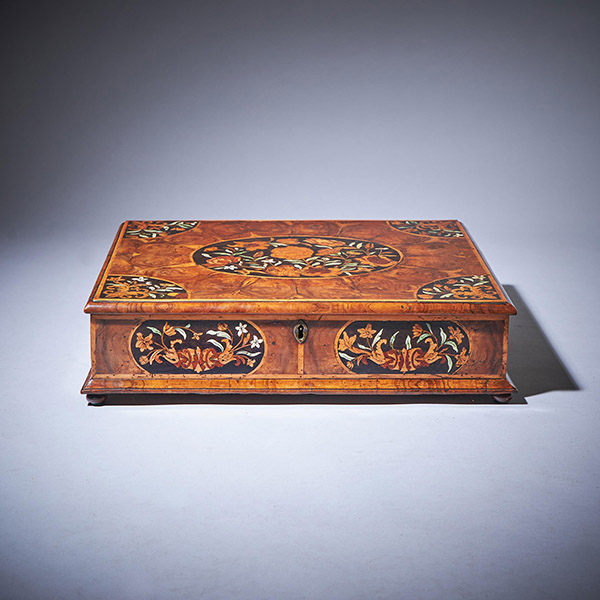
17th Century William and Mary Floral Marquetry Olive Oyster Lace Box, Circa 1685
17th Century William and Mary Floral Marquetry Olive Oyster Lace Box, Circa 1685 £16,000Follow...
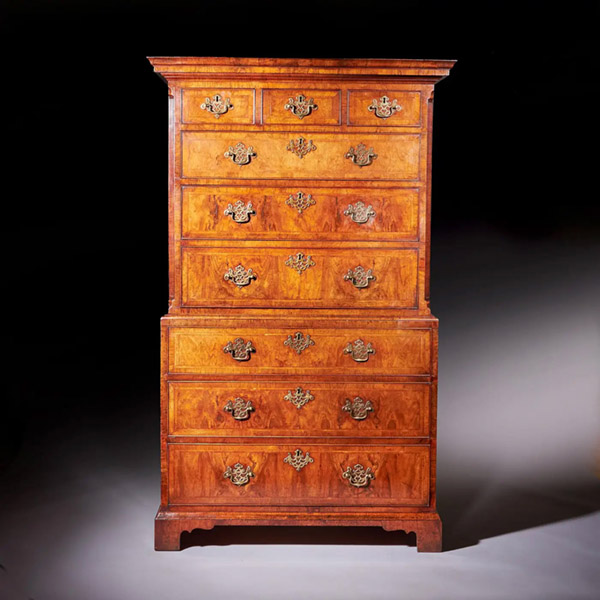
A Fine 18th Century George II Figured Walnut Chest on Chest or Tallboy, 1740
A Fine 18th Century George II Figured Walnut Chest on Chest or Tallboy, 1740 £14,000[wpforms_selector form_id="11387" _builder_version="4.22.1" _module_preset="default" custom_margin="-30px||||false|false" hover_enabled="0"...

A Unique Early 18th Century Diminutive George I Figured Walnut Bachelors Table
A Unique Early 18th Century Diminutive George I Figured Walnut Bachelors Table £12,800Follow UsA...

A Fine 18th Century George II Mahogany Marble Topped Console Table, Ireland
A Fine 18th Century George II Mahogany Marble Topped Console Table, Ireland SoldFollow UsA Fine...

A Fine Pair of 18th Century George III Silver Engraved Open Fret Wine Coasters
A Fine Pair of 18th Century George III Silver Engraved Open Fret Wine Coasters £3,600Follow UsA...

A Large 18th Century George I Gilt-Gesso Pier Glass, Attributed to John Belchier
A Large 18th Century George I Gilt-Gesso Pier Glass, Attributed to John Belchier £42,000Follow UsA...

17th Century William and Mary Floral Marquetry Olive Oyster Lace Box, Circa 1685
17th Century William and Mary Floral Marquetry Olive Oyster Lace Box, Circa 1685 £16,000Follow...

A Fine 18th Century George II Figured Walnut Chest on Chest or Tallboy, 1740
A Fine 18th Century George II Figured Walnut Chest on Chest or Tallboy, 1740 £14,000[wpforms_selector form_id="11387" _builder_version="4.22.1" _module_preset="default" custom_margin="-30px||||false|false" hover_enabled="0"...
